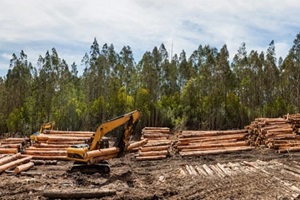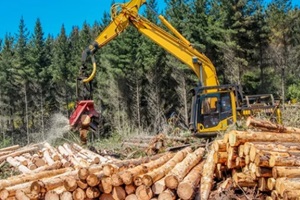 The forestry industry would be less effective without its heavy reliance on machinery. From fellers and saws to bunchers and more, forestry equipment is second only to skilled workers in terms of necessity and value.
The forestry industry would be less effective without its heavy reliance on machinery. From fellers and saws to bunchers and more, forestry equipment is second only to skilled workers in terms of necessity and value.
When this equipment needs to move from storage to the job site or from job to job, transporting it can be just as dangerous as using it. With forestry equipment insurance, your company can secure itself against potential financial losses associated with machinery damage en route to its destination.
Learn how to secure comprehensive insurance coverage for your forestry equipment during transportation, ensuring protection against risks and damages.
Understanding the Risks of Transporting Forestry Equipment
Transporting forestry equipment is an inherently risky endeavor, partly because of the machines’ size and value. Vandalism, theft, and other interference are possible along the route, and due to the extensive nature of many types of forestry equipment, they may require additional safety steps to haul.
For instance, some machines may be too tall to pass underneath certain overheads and bridges, and failure to properly plan the route can lead to damage when a machine is an inch or two too large. In addition, accidents may damage the equipment and leave the forestry company liable for damages to the other party, and insurance becomes non-negotiable.
How much insurance will cost and what it should cover will depend on each business’s unique transport needs. Insurance agencies calculate risk based on numerous factors, such as distance, transportation method, and equipment value.
Key Features of Forestry Equipment Transportation Insurance
A few policies are essential when securing forestry equipment during transport. The most significant player is inland marine coverage, which protects equipment in transit, not at the site of business.
This also covers machines while they are in a storage location. However, inland marine insurance is best paired with property insurance to ensure broad-spectrum coverage regardless of the equipment’s location. A general liability policy is also wise, as forestry equipment can cause property damage or harm to others on and off the job site.
Should such an event occur, your forestry company could be on the hook for the cost of medical bills or damages without general liability coverage. Due to the high-risk nature of forestry work, many businesses elect to strengthen their insurance protection further with an umbrella policy, which can expand coverage amounts from the general liability policy.
Most forestry transportation insurance covers basic perils such as vandalism, theft, fire, and physical damage. However, working with a reputable insurer focusing on the forestry industry can provide opportunities to expand this coverage, addressing the needs unique to your line of work, location, or project.
Implementing Best Practices for Equipment Transportation
 While insurance companies evaluate the value of the equipment, its age, the potential risk of travel, and other factors when determining the cost and coverage of an insurance policy, the agency will also consider whether your forestry business follows best practices during transport.
While insurance companies evaluate the value of the equipment, its age, the potential risk of travel, and other factors when determining the cost and coverage of an insurance policy, the agency will also consider whether your forestry business follows best practices during transport.
Minimizing risks while transporting forestry equipment can lower your premiums or increase coverage. At a basic level, use appropriate equipment for the specific equipment being hauled. Step-deck or RGN trailers are necessary for log pullers and other massive machines.
Secure straps and proper, balanced loading are essential, and the impact of proper unloading techniques must also be considered. Businesses that choose trustworthy, reliable transport providers with experience in forestry equipment are also setting themselves up for success.
Partner with Burton & Company for Your Forestry Equipment Insurance Needs
The forestry industry is home to dozens of unique machines seen nowhere else, from feller bunchers to skidders and more. Because of the niche nature of these items, many transport companies are not adequately prepared to haul them—and those still face substantial risks along the way.
Securing comprehensive insurance coverage for forestry equipment during transportation is one of the smartest moves your forestry business can make, as it safeguards against potential financial ramifications should an accident occur on the way to or from a job.
The experts at Burton & Company have years of experience helping forestry companies secure their work against the many risks of transportation and woodland business. Contact Burton & Company for expert advice and customized insurance solutions that meet your specific needs and challenges, regardless of the number of machines you use or how far they need to travel.

